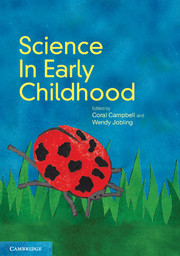Book contents
- Frontmatter
- Contents
- Contributors
- INTRODUCTION
- CHAPTER 1 SCIENCE IN THE NATIONAL EARLY YEARS LEARNING FRAMEWORK
- CHAPTER 2 LEARNING THEORIES RELATED TO EARLY CHILDHOOD SCIENCE EDUCATION
- CHAPTER 3 USING PLAY PEDAGOGY IN THE EARLY YEARS
- CHAPTER 4 TEACHING APPROACHES
- CHAPTER 5 DEVELOPING PEDAGOGICAL PRACTICES FOR SCIENCE TEACHING AND LEARNING WITH 3 AND 4-YEAR-OLD CHILDREN
- CHAPTER 6 EFFECTIVE SCIENCE LEARNING ENVIRONMENTS
- CHAPTER 7 LEARNING SCIENCE IN INFORMAL CONTEXTS: THE HOME AND COMMUNITY
- CHAPTER 8 ENVIRONMENTAL EDUCATION FOR SUSTAINABILITY AND ITS PLACE WITHIN SCIENCE
- CHAPTER 9 CATERING FOR CHILDREN'S DIFFERING NEEDS IN EARLY CHILDHOOD SCIENCE EDUCATION
- CHAPTER 10 PLANNING FOR SCIENCE
- CHAPTER 11 OBSERVING, ASSESSING AND DOCUMENTING LEARNING IN SCIENCE
- CHAPTER 12 PROFESSIONAL LEARNING – REFLECTIVE PRACTICE IN SCIENCE EDUCATION
- Additional resources
- Appendix
- Glossary
- Index
CHAPTER 3 - USING PLAY PEDAGOGY IN THE EARLY YEARS
- Frontmatter
- Contents
- Contributors
- INTRODUCTION
- CHAPTER 1 SCIENCE IN THE NATIONAL EARLY YEARS LEARNING FRAMEWORK
- CHAPTER 2 LEARNING THEORIES RELATED TO EARLY CHILDHOOD SCIENCE EDUCATION
- CHAPTER 3 USING PLAY PEDAGOGY IN THE EARLY YEARS
- CHAPTER 4 TEACHING APPROACHES
- CHAPTER 5 DEVELOPING PEDAGOGICAL PRACTICES FOR SCIENCE TEACHING AND LEARNING WITH 3 AND 4-YEAR-OLD CHILDREN
- CHAPTER 6 EFFECTIVE SCIENCE LEARNING ENVIRONMENTS
- CHAPTER 7 LEARNING SCIENCE IN INFORMAL CONTEXTS: THE HOME AND COMMUNITY
- CHAPTER 8 ENVIRONMENTAL EDUCATION FOR SUSTAINABILITY AND ITS PLACE WITHIN SCIENCE
- CHAPTER 9 CATERING FOR CHILDREN'S DIFFERING NEEDS IN EARLY CHILDHOOD SCIENCE EDUCATION
- CHAPTER 10 PLANNING FOR SCIENCE
- CHAPTER 11 OBSERVING, ASSESSING AND DOCUMENTING LEARNING IN SCIENCE
- CHAPTER 12 PROFESSIONAL LEARNING – REFLECTIVE PRACTICE IN SCIENCE EDUCATION
- Additional resources
- Appendix
- Glossary
- Index
Summary
Objectives
This chapter has the following objectives:
To support understanding of the importance of play in the holistic scientifi c development of early years' children.
To support understanding of different play pedagogies that support early scientific development.
To provide quality examples of early years' play pedagogies suitable for children up to 8 years of age.
Overview
Play is an important developmental tool, rather than just an informal aspect of childhood. Children's actions are often misconstrued as messing about without purpose as opposed to the purposeful activities we engage in throughout life. Play is of great use in early childhood, and is of value to professionals. This chapter addresses the theoretical aspects of play and its support of child development. It discusses play in the pre-school to Grade 2 school curriculum and the role of the professional in play pedagogies.
The importance of play
The importance of play is assured through the work of many theorists. Rousseau (1911) in his work ‘Emile’ identified his belief that children should be allowed to develop through play free from the restrictions imposed by society, and that early pedagogies should provide a balance between individual freedom and happiness and control from society. Most importantly, Rousseau (1911) stressed the importance of personalised learning, emphasising that adults and the context should accommodate the individual child rather than the child be expected to change to suit the adult or context. Rousseau's influence has stretched over the centuries, and it is not surprising that he is regarded as the ‘Father of Education’. Child-centred and experiential learning, central to both play and scientific development, are legacies of Rousseau's theories.
- Type
- Chapter
- Information
- Science in Early Childhood , pp. 38 - 53Publisher: Cambridge University PressPrint publication year: 2012

